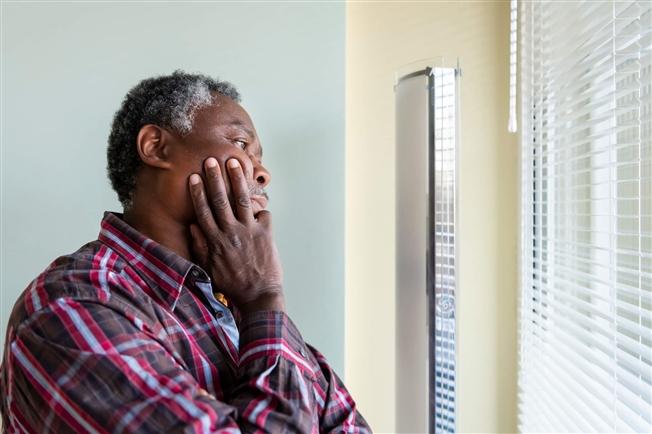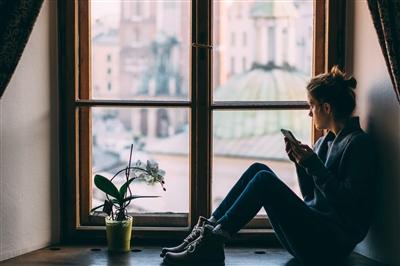Anxious about life after COVID? Here's how to cope

Being on high alert due to COVID for more than a year has had many of us in a heightened state, feeling anxious all the time whether we notice it or not. But we've also become comfortable with stay-at-home routines and shifting social and work expectations.
Now that vaccinations are increasing and spikes are decreasing, we have to learn how to cope with feeling anxious about life after COVID, which may include:
- Concern about being with people who aren't vaccinated (if you're vaccinated)
- Worry about new virus strains and exposure
- Dread of returning to a commute or on-site work
- Hesitancy about re-engaging with children's sports and activity schedules
- Fearing a sudden shift to a busier work schedule
Because we've grown accustomed to so much lack of certainty, there's also an underlying sense of "Is this for real?" – or will we be quarantined yet again?
"Whether or not someone identifies with anxiety related to the pandemic, just having that 'unknown' hanging out there for so long causes feelings of unrest in just about everyone," says behavioral health counselor Chris Edwards, MS, LPC, NCC, division manager of Mirmont Outpatient Center Broomall, part of Main Line Health. "For people who were already prone to anxiety before COVID, this past year has likely amplified anxious feelings. Now we're asking people to get out a little and safely enjoy life with family and friends. For some, this is a mixed blessing."
There are already studies showing pandemic-related anxiety tendencies in young people and an additional study is underway to assess anxiety and motivation during the COVID crisis, to understand how behaviors are different for people who have anxiety vs. those who do not.
Ways to cope with anxiety about life after COVID
This stop-and-start way of life may not be over yet so it's critical for mental health and well-being to develop ways of coping with feelings of anxiety related to life after COVID and to navigate life in new ways.

Edwards also reminds us, "It is perfectly acceptable and even advisable to seek help or support if your anxiety impedes on your life in any way and stops you from doing things you may have previously or currently enjoy."
- Acceptance – Often times we speculate about what might happen in the future and we're dissatisfied with what's happening now — all of which can cause anxiety because we're not being accepting of what "is."
"The definition of anxiety is 'fear of the unknown,'" says Edwards. "Taking charge of what we can is a great way to help reduce that fear. When you're in control you have less unknown. Another way to ease feelings of unrest is to tell yourself (and others) that 'This too shall pass.' It may be inconvenient or uncomfortable, and certainly it's new territory for everyone on the planet, but we will get through it. It's what we must all accept at this time."
- Breathwork/meditation – If you've already picked up this healthy habit, then you're well on your way to making it a lifelong practice. Using the breath to relax the body and mind is an ancient practice and you can do it any time, anywhere, as often as you like. There are different variations on breathwork, but one simple exercise is 4-4-4: Inhale through the nose, deeply and gradually for the count of four; then hold your breath at "the top" for a count of four; then exhale slowly through the mouth, making a loud blowing sound, for a count of four. You may also benefit from any one of the meditation apps out there, such as Calm, Insight Timer, Headspace and Breethe. The Happier app and website is great for daily inspiration, including quotes and stories that connect us to our humanity and remind us what's important in life.
"Mindfulness through meditation and breath work is a strong emphasis here at Mirmont," adds Edwards. "We take a holistic approach to mental health therapy as well as drug and alcohol treatment, encouraging patients to employ these practices, which help support their success in therapy as well as in recovery. 'As long as you're breathing you're still alive.' I love saying that to patients and staff."
- Self-care – This may be one of the greatest "gifts" of the pandemic as self-care is no longer on the sidelines of people's lives but rather it is unapologetically prescribed for everyone, every day, as a way of coping with the pandemic and its effects. You may already have prioritized self-care, such as:
- Paying attention to personal hygiene
- Being more physically active
- Going outside for fresh air and a walk
- Reading a book quietly in the morning
- Engaging in a hobby like gardening, cooking, or coloring in coloring books
...and any number of things that you can do that are enjoyable and relaxing. The main goal is to make sure you do something every day to take care of you. This approach to taking care of self, first and foremost, is important to maintain even as we ease into life after COVID.
"Self-care also includes not overscheduling yourself. It includes sticking to behaviors and practices that matter to you, like masking when appropriate, and speaking up and advocating for yourself when you're uncomfortable," advises Edwards. "The social aspect of masking is so important. (We see people falling to peer pressure, not wearing a mask when they think they should, but they're afraid to stand out.) You should be confident in yourself and your decision, especially when it comes to personal safety."
- Communication – Some anxiety related to life after COVID may be alleviated by simply communicating with people you're planning to spend time with. Let others know that masking is still important to you, or that you prefer to get together with smaller groups — whatever puts you most at ease, just say it. That way your mind won't be racing with "What ifs" and concerns about getting together with people. Regardless of people's practices, for the most part everyone wants to respect others and what's important to them.

You have a say in how much or little you wish to engage with life after COVID. - Selectivity – There's no need to jump back into a way of life that no longer serves us. If you had a hectic schedule before and are feeling uneasy about demands being placed on you, make sure you're being selective about activities and outings and whom you spend time with. If you haven't been out to eat for many months, maybe a brief coffee date with a friend is all you can handle at the moment. Or if you're being invited to larger gatherings, decide whether you'll be able to enjoy yourself in that environment, or if you'd prefer to pass for now or perhaps stay for just an hour or two. Take note of what feels right for you and guard your schedule in the same way you have been doing. One outing per week with a friend may be just enough, but two or three get-togethers every week may be too much. You have a say in how much or little you wish to engage with life after COVID.
Remind yourself that you can handle whatever life may bring. You've already been doing it successfully and you have the opportunity to ingrain healthy behaviors now that will serve you for the rest of your life.
Need support for anxiety related to life after COVID or other life challenges? Mirmont provides outpatient group and individual therapy and drug and alcohol treatment for ages 14 and up.
Start the road to recovery today. Call us at 1.888.CARE.898 (227.3898) to schedule a confidential appointment and ask any questions.
 Content you want, delivered to your inbox
Content you want, delivered to your inbox
Want to get the latest health and wellness articles delivered right to your inbox?
Subscribe to the Well Ahead Newsletter.
